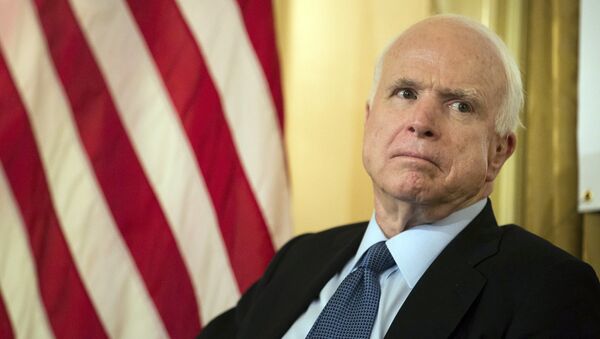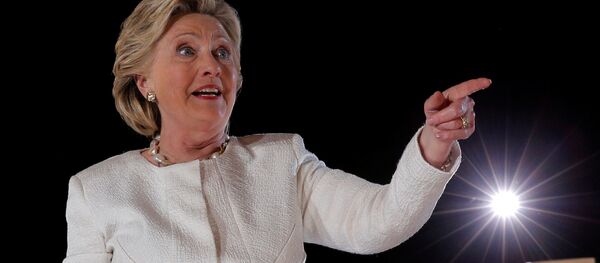Republican Senator John McCain and two Democratic lawmakers, Mark Warner and Amy Klobuchar are pushing ahead with the Honest Ads Act (H. R. 4077) aimed at prohibiting foreigners from posting political ads on US online media platforms. However, fears have emerged that the bill could curtail the rights of Americans in the first place.
The initiative advocated by McCain originates from the assumption that Russia-linked entities bought $100,000 worth of political advertisements on Facebook to tip the balance in Donald Trump's favor during the presidential race. Moscow denied the allegations as groundless and unproven.
"John McCain should concentrate upon his own health problems — his suggestion is loopy," Wall Street analyst Charles Ortel told Sputnik. "Aggregate sums spent upon advertising during the 2015/16 cycle are denominated in the billions and even these large sums may have had less influence upon voting than decades ago, when it was much tougher for the public to ferret out the truth."
'McCain Does Cultivate Foreign Government Contributions'
Responding to the question why Senator McCain has personally spearheaded the initiative, Ortel said: "Donald Trump was quite tough on McCain during the 2015/16 cycle so I suspect the senator is simply in 'payback' mode and he does hold power and influence given his many years in the Senate."
"I disagree on many things that McCain does and is doing, but I do believe the regulatory apparatus in place inside the US, and most countries are not robust enough to attempt influence over multinational entities including Facebook that are well financed, and may engage in activities that are tough for bureaucrats to understand and to police on a timely basis," he said.
In one of his previous interviews with Sputnik, Ortel shed light on the activities of The McCain Institute for International Leadership at Arizona State University (ASU), which was founded in 2012 with $8.7 million in funds leftover from McCain's 2008 presidential campaign.
"John McCain does love his foreign adventures and does cultivate foreign government and wealthy individual contributions," the Wall Street analyst said in his September interview.
READ MORE: Power Games: What McCain, Soros and the Clintons Have in Common
Honest Ads Act 'Imposing Broad Burdens on Americans' Speech Rights'
Citing Mark Penn, a famed American political pollster and consultant, Ortel noted that even if the Russians had invested in the ads, they would not have influenced the results of the vote anyway.
"Penn has estimated that electioneering related Facebook ads potentially tied to Russia amounted to $6,500 in total," Ortel suggested. "In no universe did such spending affect anything."
Keep hearing about "tiny" amount of money spent on Facebook ads. What about the billions of dollars of Fake News on CNN, ABC, NBC & CBS?
— Donald J. Trump (@realDonaldTrump) 21 октября 2017 г.
In his op-ed for The Wall Street Journal, Penn, who was chief strategist for Bill and Hillary Clinton's presidential campaigns in 1996 and 2008, respectively, noted wittily, "Russia didn't win Trump the White House any more than China re-elected Bill Clinton in 1996."
"The danger is that bending facts to fit the Russia storyline may nudge Washington into needlessly and recklessly regulating the internet and curtailing basic freedoms," the prominent US political consultant warned.
Crooked Hillary Clinton spent hundreds of millions of dollars more on Presidential Election than I did. Facebook was on her side, not mine!
— Donald J. Trump (@realDonaldTrump) October 21, 2017
The Center for Competitive Politics (CCP), a nonprofit organization whose mission is "to promote and defend First Amendment rights to free political speech, assembly, and petition," echoed Penn's concerns.
"Even without disclosing the 'devil in the details' of their bill, the legislative principles the Senators have announced are concerning. Though purporting to regulate Russia, in fact, this regulates Americans," CCP Chairman and former Federal Election Commission Chairman Brad Smith said in a statement, adding that the legislation is "imposing more broad burdens on Americans' speech rights rather than targeting foreign interests interfering with our elections."
The websites would face severe punishment if they do not make "reasonable efforts" to prevent foreign advertisers from purchasing politically-themed ads "directly or indirectly."
CCP President David Keating warned that "the combined and foreseeable effect of these record-keeping requirements and liability burdens is that internet platforms may simply stop selling advertising at lower dollar amounts," adding that this could deprive "small grassroots groups" of an opportunity "to get their message out."
Is the Deep State Seeking to Expand Control Over Internet?
Given the concerns voiced by the First Amendment watchdog, is it possible that the deep state is seeking to maintain closer control over the internet and legitimize this approach under the smokescreen of the Trump-Russia narrative?
"I think the public must reassert control, as soon as practicable," Ortel highlighted, commenting on the issue, "Absolute power corrupts absolutely, someone correctly said, long ago."
"I can only guess — but I do believe the Deep State must be held to account and especially that contractors and those who are entitled to use sensitive data may not be allowed to harness this for personal gain, outside supposed service of we, the people, in their government roles," the Wall Street analyst told Sputnik.
However, the investigative journalist reiterated that Facebook, Google, Twitter and other social media platform giants do deserve scrutiny: "I wonder about the 'business model' of what I call 'derivative' companies — entities such as Facebook and Google that offer 'free' services to users in exchange for the provision by users of data, and then monetize this valuable data. I do not believe the exchanges involved are fair and equitable," Ortel warned.
The views expressed in this article are solely those of the author and do not necessarily reflect the official position of Sputnik.




